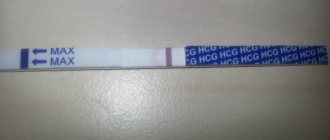Norm and frequency of regurgitation in infants
According to statistics:
- In the first weeks of life, regurgitation occurs on average in 80% of infants.
- By 3 months this happens less frequently.
- By about a year (for some a little earlier, for some a little later) it stops completely.
The maximum age at which regurgitation should completely stop is 1.5 years. Otherwise it should be considered a deviation.
Up to 4 months, the norm for a child to burp is no more than 2 teaspoons after each meal. Also considered normal is a condition in which the baby burps once a day in a volume of 3 teaspoons. In some cases, even regurgitation in a fountain is acceptable, but not more than once a day.
Important! Pay attention to the fact that at the time of burping the child does not show much anxiety. The rest of the time, he should eat well, be alert and active, and gain weight based on his age.
https://youtu.be/-QNBHeLu_P8
Everything is okay
A simple test helps determine exactly how much food a child regurgitated: 1 tbsp. l. water is poured onto the diaper and the size of the resulting stain is compared with the size of the stain after regurgitation. The norm is regurgitation after each feeding in a volume of 1-2 tbsp. spoons, 15-20 minutes after feeding. If the baby feels great, urinates often and gains weight well, then these regurgitations do not pose any health hazard. Most often, regurgitation bothers babies at the age of 4-5 months, and by 6 months, as a rule, it disappears completely or becomes significantly smaller. If the baby spits up 6-8 times a day in small portions, this is normal for the child.
Differences from vomiting
Regurgitation is a normal process that does not require treatment. As for vomiting, it is a sign of disease. In both cases, the contents of the stomach are released, so you need to be able to distinguish between these 2 processes.
You can find out whether a child is regurgitating or vomiting by the following signs::
- When regurgitating, a small amount of substances “comes out” from the body, and their separation occurs without problems. After this, the baby behaves normally.
- Regurgitation in a baby usually occurs after feeding, and vomiting occurs at any time of the day, regardless of food intake.
- Regurgitation is often a one-time process (per day), and vomiting can occur again and again.
- When regurgitation occurs, unchanged or slightly coagulated nutrition leaves the body. Attacks of vomiting are characterized by digested food and gastric juice with bile.
- When regurgitating, the child’s well-being should not worsen, but vomiting invariably leads to poor health.
How not to confuse newborn belching with vomiting?
The mechanism of regurgitation and vomiting is almost the same. In both cases, gastric contents enter the esophagus and further release of masses through the oral cavity.
But if belching is a normal phenomenon for infants, then vomiting indicates the presence of an infectious process or other pathological conditions. Vomit is characterized by abundance, fetid odor, and the presence of undigested pieces.
During the process of regurgitation, milk flows out in a thin stream (like saliva), while vomit can flow like a fountain and be released even through the nasal passages.
What other signs can be used to distinguish belching from vomiting?
- The child's condition.
The most important indicator to pay attention to. Physiological belching does not cause concern and does not cause any discomfort to the baby. If vomiting is a sign of an infectious disease, the child will be lethargic, capricious, and have problems with appetite.
- Body temperature.
When vomiting, body temperature rises to 38-39.5 degrees. At the same time, signs of intoxication are observed: diarrhea, weakness, chills.
- Contents of the mass.
When a baby burps, milk comes out, which may be curdled. It often contains curdled pieces. Vomit in infants often has a foul odor and may contain bile acids.
- Color.
When regurgitated, the masses are white, cream or milky in color. If the contents of the stomach are green or brown, this is vomiting.
- Time of occurrence.
The baby belches milk strictly after feeding (immediately or after a few minutes); vomiting can occur at any time, regardless of food intake.
Reasons: Why does this happen to newborns?
Why does my baby spit up a lot? There can be many reasons for regurgitation in a baby. Let's list some of them:
- Weak alimentary sphincter muscles . One of the key reasons for a child’s regurgitation in the first months of life is the physiological characteristics of the lower esophageal sphincter and the fundus of the stomach. Since they are not developed enough, and the pyloric section of the stomach, on the contrary, is better developed, babies regurgitate.
- Wrong choice of mixture . Often parents do not understand what causes regurgitation, although the answer lies on the surface - the wrong mixture. Despite the fact that the formulas are most adapted for small children, they do not contain substances that are found in breast milk. It can be very difficult for an undeveloped stomach to digest it.
- Binge eating . A child may also spit up due to the large amount of formula consumed. If the child spits up a lot for this reason, then you need to reduce the baby's diet. The same situation arises when switching from breastfeeding to mixed or completely artificial.
- Ecology . Tobacco smoke and other allergens surrounding the baby cause esophageal spasm. To avoid frequent regurgitation due to improper ecology, try to limit the child from its exposure.
- Aerophagia. This term means swallowing air while eating. Reasons for this:
- a large hole in the nipple of the bottle when feeding with formula;
insufficient filling of the nipple on the bottle with milk.
- Intestinal disorders . Flatulence (bloating), intestinal colic (spasms), and constipation can lead to regurgitation in a baby. As a result of all these processes, pressure in the abdominal cavity increases and the movement of food through the gastrointestinal tract is disrupted. The same symptoms can also occur when a baby is swaddled tightly or wears rompers with a tight elastic band. All this should be avoided so that the baby does not burp often.
- Congenital defects. It happens that regurgitation in babies is caused by serious defects:
- malformations of the gastrointestinal tract: pyloric stenosis (narrowing at the junction of the stomach into the duodenum, which interferes with gastric emptying), diaphragmatic hernia (movement of part of the abdominal organs into the chest cavity) and others;
- dysfunction of the central nervous system resulting from complications during pregnancy or childbirth;
- metabolic disorders that are inherited (phenylketonuria, galactosemia and others).
- Incorrect care . If after feeding the baby is bathed, changed, or stirred, he will burp frequently and profusely. Physical activity does not allow the stomach to digest food calmly, so relieve your baby of it.
- Poor quality food . Low-quality foods are an extremely common cause of digestive disorders. If the child’s body cannot digest the foods that enter it, it will try to remove them back.
- Hyperactivity syndrome . Overly active kids cannot sit still. After eating, they wiggle their arms and legs, spin around and are simply in a restless state. This makes it difficult for the stomach to function, which is why excessive regurgitation occurs.
Aerophagia is characteristic of children with excessively small or, on the contrary, large weight.
Causes of regurgitation in infants
Overeating during artificial and breastfeeding
The most common cause of belching milk after feeding. A child's stomach is very small and he needs very little food to be full. It is easier for parents whose children are bottle-fed to control this process and make sure that the baby does not eat more formula than is appropriate for his age.
But mothers of babies who eat breast milk often overfeed their children. This happens most often when the breast is given to the baby on demand, not only as a source of food, but also for comfort.
What you need to do to avoid overfeeding:
- breastfeed every 2.5-3 hours (depending on the age of the child and provided that the mother has good lactation);
- if the baby cries, you don’t need to give him the breast right away (you need to try to calm him down in other ways);
- The baby must receive fore and hind milk to meet its need for fluids, sugars and fats, so the breast must be changed every 4 hours.
Features of intestinal motility
During feeding, the baby makes several sucking movements (usually 3-5 sips), after which he swallows what he managed to suck milk from the breast or formula from the bottle. The milk quickly reaches the stomach.
If this period coincides with contraction of the intestines, there is an increase in pressure on the bottom of the stomach, due to which part of the food eaten is pushed back into the esophagus and oral cavity.
Nervous system activity
The nervous system of a baby is imperfect from birth and reacts to any change in its usual environment. Even changing the night light in the room can have an impact on the fragile psyche of the baby.
Children with this syndrome often cry, react hard to strangers, and show anxiety about almost any reason. You can suspect pathology (albeit relative) at an early age by frequent regurgitation.
Cardiac sphincter weakness
The sphincter located between the esophagus and the cardiac part of the stomach fully matures by 6 months. By contracting, it prevents gastric contents from entering the esophagus. Before this age, it is the weakness of the sphincter that can lead to belching after feeding.
Intestinal colic and flatulence
Colic, which occurs as a result of the accumulation of gases in the intestines, is another reason why a baby spits up milk. Gases press on the walls of the stomach, pushing food back out.
Other reasons
Other reasons that may cause undigested milk to be released include:
- tight swaddling (tight wrapping in a sling);
- improper attachment and swallowing large amounts of air during feeding;
- lying in a horizontal position for a long time;
- insufficient development of brain centers responsible for the feeling of satiety.
When should you see a doctor?
Parents are advised to take their child to the doctor as soon as possible if:
- the baby refuses to eat;
- the child is sleepy and lethargic;
- the baby's body temperature has increased;
- attacks of vomiting occur more often than three times a day or are repeated within 6 hours;
- the baby has loose stools;
- the child’s tummy is swollen and hurts;
- the baby has signs of dehydration: dry lips and tongue, urination occurs rarely, and urine is darker than usual;
- the presence of blood in the vomit;
- there is blood or mucus on the diaper.
It is important!
If the baby spits up a lot and constantly, parents should consult a doctor. After all, in addition to discomfort in everyday life for the baby, this can be a symptom signaling serious health problems.
Food allergies
. A newborn receives all sorts of substances from mother's milk: from beneficial to those that cause severe allergies. Regurgitation may be a reaction to one of the allergens. A reaction may also appear when switching to artificial nutrition. Thus, allergies to cow protein are the most common in newborns. In this case, you can choose a medicinal mixture based on highly hydrolyzed cow's milk protein, which in this state does not cause allergies.
Gastroesophageal reflux disease.
This serious disease that causes infant underweight has primary symptoms similar to normal regurgitation, so infants do not have one symptom or group of symptoms to diagnose this disease. In this case, doctors exclude alarming signals and carry out postural therapy, as well as adjust the baby’s diet. If after a year the child still has symptoms of GERD, the doctor will prescribe an additional examination.
Pyloric stenosis and intestinal obstruction.
The first disease occurs in newborns under the age of one month and is characterized by thickening of the stomach wall, which makes it difficult for food to enter the small intestine. In this case, the baby burps profusely, but there is no fever or diarrhea. Intestinal blockage is characterized by the presence of greenish bile in the regurgitated mass. This disease requires immediate specialist intervention.
What to do if a child often spits up like a fountain?
What should you do if your baby vomits like a fountain?
- Massage . If a child is vomiting like a fountain, abdominal massage will be an excellent help. His technique is simple - just lightly stroke the abdominal area clockwise, while applying light pressure.
- Standing in a column after feeding . After you have fed your baby, you should hold him upright for at least 20 minutes, and then carry him exclusively in an upright position. When all the excess air has come out of the stomach, let the baby lie down and rest.
- Reducing portions . If you can't figure out why your baby spits up frequently after formula feeding, make sure you don't overfeed him. This is very simple to do - just cock the baby before and after feeding.
- Other methods . It is recommended to keep your baby in the correct position during feeding. This will prevent the baby from swallowing air along with the mixture, which leads to subsequent regurgitation.
Medicines
Drug treatment may include taking the following medications:
- Antacids. This group includes drugs that adults take for increased stomach acidity and heartburn, for example, Phosphalugel and Maalox.
- Children under 6 months of age should be given 1 teaspoon after meals.
- From 6 to 12 months – 2 teaspoons. The drug should be taken for 3 weeks.
- Medicines that stimulate gastrointestinal motility . These drugs have many side effects, so they should be given to infants only when absolutely necessary. Motilium causes the least harm. These drugs should be taken at the rate of 0.25 mg per kg of body weight 3-4 times a day 30 minutes before meals. The course of treatment usually lasts from 10 to 14 days. The purpose of taking the drug is to speed up the passage of food through the stomach.
- H2 receptor blockers . Used in extreme cases: in case of continuous and profuse regurgitation, when there is a risk of dehydration. This group includes the drugs Ranitidine (5-10 mg per kg of weight) and Famotidine (1 mg per kg of weight). The course of treatment is up to 3 months.
It is important!
Regurgitation occurs in 80% of newborns and usually does not cause any pathology. In this case, the process occurs passively, that is, the muscles of the anterior abdominal wall, diaphragm and stomach are not involved.
Rare, small volume regurgitation after feeding does not require special monitoring and treatment.
Many young parents, when their newborns experience frequent regurgitation after feeding, panic and try to take some action to prevent this process. But the main thing is to understand the causes of regurgitation and be able to distinguish regurgitation from vomiting. Such knowledge will help to track abnormal processes in a timely manner, which will make it possible to promptly consult a doctor, because too much or frequent regurgitation in children can be a sign of diseases or developmental abnormalities.
Prevention
To prevent repeated regurgitation of the baby, it is necessary to prevent this process:
- If the baby cries, feed him a little later.
- When feeding your baby with a bottle, tilt the bottle at an angle so that the formula completely fills the nipple.
- When buying a new pacifier, be sure to check that it has medium-sized holes.
- Make sure that clothes or diapers do not put pressure on the baby's stomach. It is also not recommended to swaddle babies tightly, and instead of pants with an elastic band, it is better to dress the baby in rompers that fasten at the shoulders.
- When sleeping, it is preferable to place the child on his right side. This will reduce the intensity of the reflux of stomach contents into the esophagus. You need to place a small pillow from a pair of folded diapers under the baby’s head or raise the crib legs at the head of the bed by 5-10 centimeters.
Why does a baby spit up after formula feeding?
There are several reasons why a baby may burp after feeding. Let's look at each case separately.
Swallowing air while eating
Regurgitation is possible due to aerography or swallowing a large amount of air. The bubbles come out along with the mixture.
A child swallows air if:
- he eats very quickly;
- there is a large hole in the bottle;
- He is in the wrong position during feeding.
To avoid airbrushing, feed your baby in a semi-sitting position. Choose a bottle with a small hole; when giving the baby formula, take breaks every 10 sips. This way, less air bubbles will enter the stomach, and regurgitation will occur less frequently.
Binge eating
Another common cause of regurgitation is overeating. If the food that the child has eaten does not fit into the stomach, then it comes out.
The optimal volume of mixture given to the child is determined by the doctor. It depends on the weight and age of the baby. If it turns out that the baby is spitting up due to overeating, increase the interval between feedings or reduce the volume of the formula.
Incorrect mixture
If your baby spits up after every feeding, the formula may simply not be suitable for him. In this case, you should choose another one together with your pediatrician. Pay attention to baby food with colic-relieving ingredients.
Inhalation of cigarette smoke
If parents smoke, they need to take into account that cigarette smoke causes a gag reflex in children. During feeding, mom or dad breathes on the baby, he smells a nasty smell, hence the regurgitation.
Give up the bad habit or smoke away from your child!
Poorly developed muscles of the lower alimentary sphincter
In the place where the esophagus is connected to the stomach, there is a food sphincter. This is a valve that prevents food from moving backwards. In other words, the food sphincter prevents food from passing from the stomach to the esophagus.
In young children, the muscles of this valve are still poorly developed, so this function is not performed. There is nothing wrong with this; the sphincter will be fully functional after six months of life (in some cases even earlier).
Ecology
If you live in an environmentally polluted area, be aware that this environment contributes to the development of food allergies. Because of this, regurgitation can also occur.
Constipation, bloating, colic
If your baby has colic or constipation accompanied by bloating, this may also be the cause of regurgitation. Due to air bubbles, food does not move through the digestive tract, so it is expelled.
For colic, you can give your baby dill water, stroke his tummy or put a warm sheet on him. Before feeding the baby, place him on his tummy for 5 minutes, when finished, hold him in an upright position, then put him in the crib. This will help the problem.
Tips for parents
If a baby experiences frequent and profuse regurgitation after feeding with formula, this is due to purely physiology. In such cases, parents could use a few tips :
- before eating, the child should be placed on a hard surface with his stomach down;
- after feeding, you need to limit the baby’s mobility and activity as much as possible;
- you need to feed the baby more often, but in smaller portions;
- provide the child with an active lifestyle outside of feeding: bathing, walking, massage and daily gymnastics will strengthen the muscles responsible for the functioning of the gastrointestinal tract.
Often these actions are enough to fix the problem.
Reference! However, if the situation does not change, the frequency of regurgitation does not decrease, you should contact your pediatrician for advice.
The various causes of regurgitation in infants have been listed above. As already mentioned, in addition to physiological and functional reasons for regurgitation, there are also organic ones. This problem sometimes requires surgery. Fortunately, organic causes are extremely rare. If your baby spits up frequently, seek help from a doctor, even if the rest of the time the baby feels well and shows no signs of anxiety.
How to reduce regurgitation?
Parents must understand that regurgitation is not a disease, but a symptom of the physiological characteristics or pathological condition of the child. There is no need to treat regurgitation - you can only take measures to prevent excessive milk discharge and reduce discomfort for the child.
What can parents do to reduce spitting up?
- For colic, it is allowed to use products based on simethicone or dill water (fennel).
This will help eliminate increased gas formation and reduce pressure on the stomach.
- Some parents, following the advice of pediatricians, swaddle their baby at night to prevent night regurgitation.
This method is effective only for children with increased nervous system activity. In this case, loose swaddling really has a calming effect, reminding the baby of the period when he lived in his mother’s tummy. Healthy and calm children do not need to be swaddled at night (after one month of age).
- A pacifier can also help prevent burping.
Sucking movements trigger intestinal peristalsis, which has a positive effect on digestion and reduces the number of regurgitations.
- The baby's daily routine and lifestyle should be active.
It is necessary to walk a lot with the baby, bathe him daily, attend additional health-improving activities (or do them yourself): gymnastics for infants, massage, swimming. The more the baby moves, the more actively the muscular system develops, which directly affects the frequency of regurgitation.
- After each feeding, it is necessary to carry the baby in a column until he burps air.
- It is important to monitor the amount of food eaten, since overfeeding is the main cause of regurgitation in children under 6 months of age.
The doctor shares advice with parents on what preventive measures can be taken to prevent regurgitation.
How to prevent regurgitation during sleep?
Pillows or bolsters, which have become so popular recently among parents of infants, are extremely undesirable for young children, as they increase the risk of sudden death syndrome (SDS).
It is not recommended to place the baby on his stomach for the same reason. How to properly lay a baby so that he does not burp in his sleep (and if this happens, he does not choke in the regurgitated milk)?
- For infants, you can only use special flat pillows for newborns, which are sold in pharmacies or children's stores. You should definitely check the quality certificate for such a product!
- The pillow must be placed under the mattress, at the head of the child at an angle of approximately 30 degrees.
- The baby's head should be tilted (slightly to the side).
Sleeping in this position will help prevent regurgitation during sleep, and will also reduce the amount of mass released during the day.
Parents should not panic if the baby spits up after each feeding, but does not show signs of anxiety. Pathological regurgitation is not so common, but even if the cause lies in illness, timely consultation with a doctor will help avoid serious consequences and complications.











